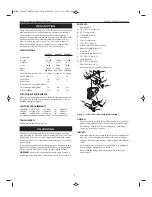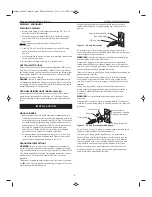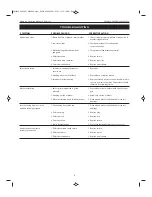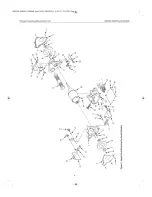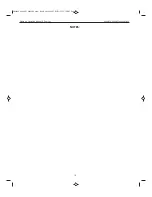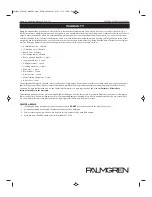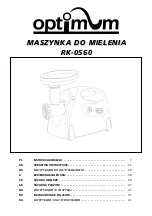
3
SAFETY RULES
WARNING:
For your own safety, read all of the instructions and
precautions before operating tool.
PROPOSITION 65 WARNING:
Some dust created by using power
tools contain chemicals known to the state of California to cause
cancer, birth defects or other reproductive harm.
Some examples of these chemicals are:
• Lead from lead-based paints.
• Crystalline silica from bricks and cement and other masonry
products.
• Arsenic and chromium from chemically-treated lumber.
Your risk from these exposures varies, depending on how often you
do this type of work. To reduce your exposure to these chemicals:
work in a well ventilated area and work with approved safety
equipment. Always wear
OSHA/NIOSH
approved, properly fitting
face mask or respirator when using such tools.
WARNING:
Always follow proper operating procedures as defined
in this manual even if you are familiar with the use of this or similar
tools. Remember that being careless for even a fraction of a second
can result in severe personal injury.
BE PREPARED FOR JOB
• Wear proper apparel. Do not wear loose clothing, gloves, neck-
ties, rings, bracelets or other jewelry which may get caught in
moving parts of machine.
• Wear protective hair covering to contain long hair.
• Wear safety shoes with non-slip soles.
• Wear safety glasses complying with United States ANSI Z87.1.
Everyday glasses have only impact resistant lenses. They are
NOT
safety glasses.
• Wear face mask or dust mask if operation is dusty.
• Be alert and think clearly. Never operate power tools when tired,
intoxicated or when taking medications that cause drowsiness.
PREPARE WORK AREA FOR JOB
• Keep work area clean. Cluttered work areas invite accidents.
• Do not use power tools in dangerous environments. Do not use
power tools in damp or wet locations. Do not expose power
tools to rain.
• Work area should be properly lighted.
• Proper electrical plug should be plugged directly into properly
grounded, three-prong receptacle.
• Extension cords should have a grounding prong and the three
wires of the extension cord should be of the correct gauge.
• Keep visitors at a safe distance from work area.
• Keep children out of workplace. Make workshop childproof. Use
padlocks, master switches or remove switch keys to prevent any
unintentional use of power tools.
TOOL SHOULD BE MAINTAINED
• Always unplug tool prior to inspection.
• Consult manual for specific maintaining and adjusting proce-
dures.
• Keep tool lubricated and clean for safest operation.
• Remove adjusting tools. Form habit of checking to see that ad-
justing tools are removed before switching machine on.
• Keep all parts in working order. Check to determine that the
guard or other parts will operate properly and perform their
intended function.
• Check for damaged parts. Check for alignment of moving parts,
binding, breakage, mounting and any other condition that may
affect a tool’s operation.
• A guard or other part that is damaged should be properly re-
paired or replaced. Do not perform makeshift repairs. (Use parts
list provided to order repair parts.)
KNOW HOW TO USE TOOL
• Use right tool for job. Do not force tool or attachment to do a
job for which it was not designed.
• Disconnect tool from power when changing accessories such as
grinding wheels, buffing wheels and the like.
• Avoid accidental start-up. Make sure that the switch is in the off
position before plugging in.
• Do not force tool. It will work most efficiently at the rate for
which it was designed.
• Keep hands away from moving parts and grinding surfaces.
• Never leave a tool running unat tended. Turn the power off and
do not leave tool until it comes to a complete stop.
• Do not overreach. Keep proper footing and balance.
• Never stand on tool. Serious injury could occur if tool is tipped
over.
• Know your tool. Learn the tool’s operation, application and spe-
cific limitations.
• Use recommended accessories. Understand and obey all safety
instructions supplied with accessories. The use of improper ac-
cessories may cause risk of injury to persons.
• Do not over tighten wheel nut. Replace cracked wheel immedi-
ately. Use only flanges supplied with the grinder.
• Adjust distance between wheel and tool rest to maintain 1/16”
or less gap.
• Handle the workpiece correctly. Whenever possible, use tool
rest to support workpiece during grinding operation. Turn tool
off if it jams.
• Always use guards and eyeshields.
• Clean grinding dust from beneath tool frequently.
CAUTION:
Think safety! Safety is a combination of operator com-
mon sense and alertness at all times when tool is being used.
ASSEMBLY
Refer to Figure 1, page 2.
Parts to be fastened to the unit should be located and accounted
for (See content list and figure 1, page 2).
CAUTION:
Do not attempt assembly if parts are missing. Use this
manual to order repair parts.
TOOL REST ASSEMBLY
1. Place tool rest (D) over tool rest bracket and secure in position
with 5/16˝ flat washer (E) and 5/16-18 x 1˝ knob (F).
2. Attach tool rest bracket to the bottom of the left wheel guard
using one 3/8˝-16 x 3/4˝ hex head bolt (A) and one 3/8˝ flat
washer (B). Make sure that the slot of the bracket is located over
the raised boss on the guard. Tighten bolts finger tight.
3. Position tool rest so that distance between tool rest and grind-
ing wheel is less than 1/16˝. Reposition angle of tool rest if
necessary. Secure all knobs and bolts.
4. Mount right tool rest in a similar manner.
Palmgren Operating Manual & Parts List 9682096, 9682097 and 9682098
9682096_9682097_9682098_oipm_En012_9642040.01 01/31/17 12:19 PM Page 3


